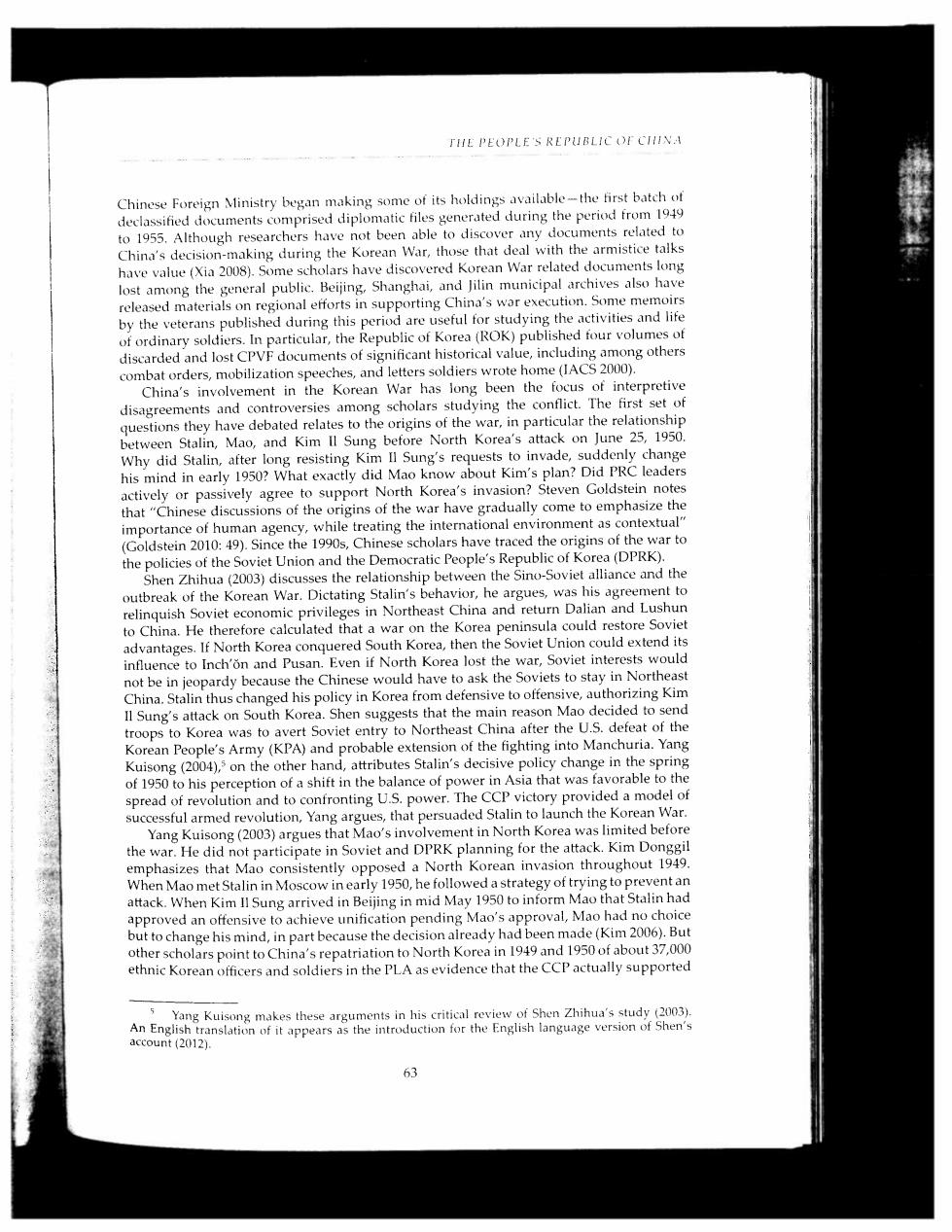正在加载图片...

THE PEOPLE'S REPUBLIC OF CHINA Chinese Foreign Ministry began making some of its holdings available-the first batch of declassified documents comprised diplomatic files generated during the period from 1949 to 1955.Although researchers have not been able to discover any documents related to China's decision-making during the Korean War,those that deal with the armistice talks have value (Xia 2008).Some scholars have discovered Korean War related documents long lost among the general public.Beijing,Shanghai,and Jilin municipal archives also have released materials on regional efforts in supporting China's war execution.Some memoirs by the veterans published during this period are useful for studying the activities and life of ordinary soldiers.In particular,the Republic of Korea(ROK)published four volumes of discarded and lost CPVF documents of significant historical value,including among others combat orders,mobilization speeches,and letters soldiers wrote home (IACS 2000). China's involvement in the Korean War has long been the focus of interpretive disagreements and controversies among scholars studying the conflict.The first set of questions they have debated relates to the origins of the war,in particular the relationship between Stalin,Mao,and Kim Il Sung before North Korea's attack on June 25,1950. Why did Stalin,after long resisting Kim Il Sung's requests to invade,suddenly change his mind in early 1950?What exactly did Mao know about Kim's plan?Did PRC leaders actively or passively agree to support North Korea's invasion?Steven Goldstein notes that"Chinese discussions of the origins of the war have gradually come to emphasize the importance of human agency,while treating the international environment as contextual" (Goldstein 2010:49).Since the 1990s,Chinese scholars have traced the origins of the war to the policies of the Soviet Union and the Democratic People's Republic of Korea(DPRK). Shen Zhihua(2003)discusses the relationship between the Sino-Soviet alliance and the outbreak of the Korean War.Dictating Stalin's behavior,he argues,was his agreement to relinquish Soviet economic privileges in Northeast China and return Dalian and Lushun to China.He therefore calculated that a war on the Korea peninsula could restore Soviet advantages.If North Korea conquered South Korea,then the Soviet Union could extend its influence to Inch'on and Pusan.Even if North Korea lost the war,Soviet interests would not be in jeopardy because the Chinese would have to ask the Soviets to stay in Northeast China.Stalin thus changed his policy in Korea from defensive to offensive,authorizing Kim Il Sung's attack on South Korea.Shen suggests that the main reason Mao decided to send troops to Korea was to avert Soviet entry to Northeast China after the U.S.defeat of the Korean People's Army(KPA)and probable extension of the fighting into Manchuria.Yang Kuisong(2004),5 on the other hand,attributes Stalin's decisive policy change in the spring of 1950 to his perception of a shift in the balance of power in Asia that was favorable to the spread of revolution and to confronting U.S.power.The CCP victory provided a model of successful armed revolution,Yang argues,that persuaded Stalin to launch the Korean War. Yang Kuisong(2003)argues that Mao's involvement in North Korea was limited before the war.He did not participate in Soviet and DPRK planning for the attack.Kim Donggil emphasizes that Mao consistently opposed a North Korean invasion throughout 1949. When Mao met Stalin in Moscow in early 1950,he followed a strategy of trying to prevent an attack.When Kim II Sung arrived in Beijing in mid May 1950 to inform Mao that Stalin had approved an offensive to achieve unification pending Mao's approval,Mao had no choice but to change his mind,in part because the decision already had been made(Kim 2006).But other scholars point to China's repatriation to North Korea in 1949 and 1950 of about 37,000 ethnic Korean officers and soldiers in the PLA as evidence that the CCP actually supported 5 Yang Kuisong makes these arguments in his critical review of Shen Zhihua's study (2003). An English translation of it appears as the introduction for the English language version of Shen's account (2012). 63